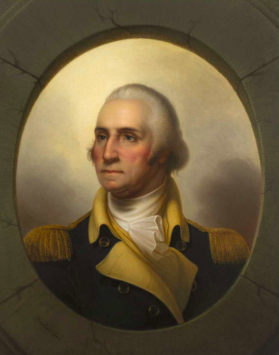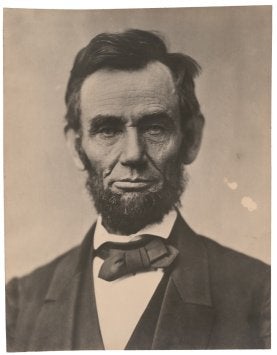Classroom and Parent Resources for Presidents' Day
Posted by Gilder Lehrman Staff on Monday, 02/13/2023
 Presidents’ Day, celebrated on the third Monday in February, recognizes the birthdays of George Washington and Abraham Lincoln, ten days apart from each other.
Presidents’ Day, celebrated on the third Monday in February, recognizes the birthdays of George Washington and Abraham Lincoln, ten days apart from each other.
We offer many classroom and home study resources for learning more, not only about Washington and Lincoln but many other presidents throughout the country’s history:
Spotlights on Primary Sources
Gilder Lehrman curators explain and explore documents from the Gilder Lehrman Collection.
- George Washington on attending church, 1762: Enjoy a chatty August 1762 letter from Washington to his brother-in-law Burwell Bassett.
- George Washington from Valley Forge on the urgent need for men and supplies, 1777: Explore an original letter in Washington’s handwriting asking for help from New Hampshire, among other states, during the Revolutionary War.
- George Washington discusses Shays’ Rebellion and the upcoming Constitutional Convention, 1787: On February 3, George Washington wrote to Henry Knox about rebellion in the context of creating a new constitution.
- John Adams describes George Washington’s ten talents, 1807: Eight years after George Washington’s death, John Adams penned this letter to Benjamin Rush explaining why Washington was considered a hero by the American people.
- Abraham Lincoln’s “House Divided” Speech, ca. 1857–1858: In this speech fragment from 1857, which he later expanded as the opening speech of his 1858 US Senate campaign against Stephen A. Douglas, Abraham Lincoln identified slavery as a moral and political issue that threatened the continued existence of the United States.
- Lincoln on abolition in England and the United States, 1858: In this undated speech fragment believed to be from the 1858 Senate race, Lincoln stated his opposition to slavery as an inhumane practice.
- Lincoln on the execution of a slave trader, 1862: This refusal of clemency for a convicted slave trader stands out among the papers of Abraham Lincoln, a man renowned for his mercy.
- Franklin Roosevelt’s advice to high school students: In 1922, Sharpless Dobson Green, a teacher at Senior High School in Trenton, New Jersey, wrote to influential people around the world to get their advice for his students. Franklin Delano Roosevelt, a decade before becoming president of the United States, responded.
Online Exhibitions
Inside the Vault Videos
 Inside the Vault: Highlights from the Gilder Lehrman Collection is a free monthly online program that highlights unique primary sources from the Gilder Lehrman Collection, led by Institute curators and special guest historians. The Inside the Vault archive is rich with past programs centered on American presidents. Enjoy these classroom-friendly explorations, all accompanied by additional resources:
Inside the Vault: Highlights from the Gilder Lehrman Collection is a free monthly online program that highlights unique primary sources from the Gilder Lehrman Collection, led by Institute curators and special guest historians. The Inside the Vault archive is rich with past programs centered on American presidents. Enjoy these classroom-friendly explorations, all accompanied by additional resources:
- George Washington’s Inauguration
- Abraham Lincoln
- The Life and Times of Theodore Roosevelt
- The New Deal and FDR’s Presidential Campaigns
- The Assassination of President Kennedy
- Eisenhower’s Views on Vietnam in 1967 and 1968
History U Courses
History U offers free, self-paced courses in American history to high school students led by the country’s top historians. Courses most relevant to Presidents’ Day are
- Foundations of American Government
- American Revolution
- World War II (featuring Franklin Roosevelt and Harry Truman)
- Race and Rights in America (featuring Abraham Lincoln)
Lesson Plans
- “George Washington’s Rules of Civility”: Examine and apply George Washington’s rules of civility.
- “The First Inaugural Address of George Washington”: Students will develop a thorough knowledge of the text and the ideas President George Washington wished to convey to the American people.
- “Lincoln’s First and Second Inaugural Addresses”: Over the course of this lesson, students will examine Lincoln’s presidential aims in his first and second inaugural addresses and then compare and contrast the similarities and differences of texts to determine how his goals changed between the first and the second inaugurations.
- “Washington’s Farewell Address”: Through reading and analyzing the original text, the students will know what is explicitly stated, draw logical inferences, and demonstrate these skills by writing a succinct summary and then restating that summary in the student’s own words.
- “The Gettysburg Address”: Students will be asked to “read like a detective” and gain a clear understanding of the content of President Abraham Lincoln’s Gettysburg Address of 1863.